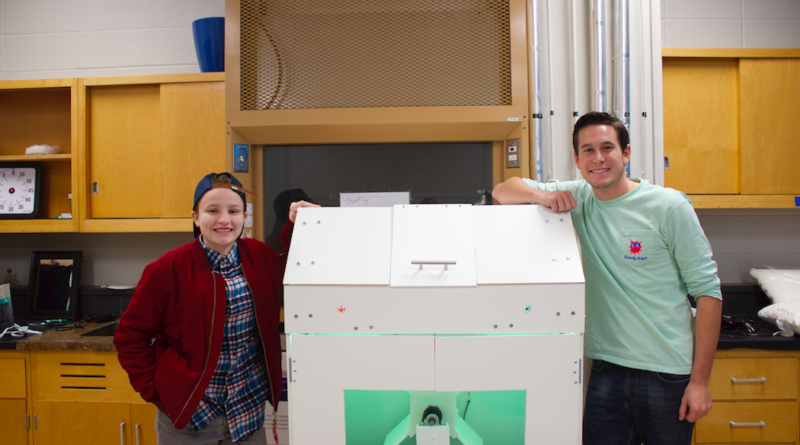Entrepreneur Spotlight: The ‘Recyclops’
Mary Kate Newman (left) and Mike Sundermeier (right) with “The Recyclops.” Photo from Sundermeier
Kaitlin Lewis
Staff Writer
The student entrepreneurs behind the “Recyclops” know what you’re thinking; yes, the name does come from “The Office.”

Recyclops started in the fall of 2018 as a senior capstone project among three engineering students, but it has since grown into the next big business venture to come from UD students.
Recyclops is a learning trashcan that reads what waste is thrown into it and sorts between what is trash and what is recyclable. Luke Schepers, Gunnar Lykins and Santiago Guerrero – the team of engineers credited with first designing this machine – created Recyclops as a way to combat the number of recyclable materials often discarded in the normal waste bin. Their original problem to solve was the waste audit of 33 percent that UD’s basketball arena saw during its 2017-18 season.
Upon finishing their first prototype, the team realized Recyclops’ business potential. That’s where Mike Sundermeier, senior marketing and entrepreneurship major, stepped in.
In December of 2018, Sundermeier joined the team to make Recyclops a marketable product. While he had been a part of two other start-ups in his college career, Recyclops has become the “most successful and most well-funded,” Sundermeier said.
After the engineering team graduated, Sundermeier became the lead on keeping Recyclops alive along with the help of the project’s advisor Emily Cory, a full-time faculty member at UD. At this time, the machine was on its third prototype and still needed some tweaks. That’s when freshman Mary Kate Newman joined the team in December 2019.
See also- Entrepreneur Spotlight: The Story Behind Handy Hats
Newman is a mechanical engineering major tasked with fixing the “mechanical sides” of Recyclops. Newman had Cory as a professor last semester, who first introduced her to the project and encouraged her to get involved. Being only a semester into her college career, Newman was hesitant to be too invested in Recyclops but didn’t need much convincing once she learned more about the machine.
“I was like ‘ok, I’m an engineering student who’s taking 18 credits as a freshman,’” Newman said. “I wasn’t sure if I had time for it. But as soon as (Cory) started telling me about what Recyclops was, what they were doing and what they needed, I fell in love.”
Newman has already finalized a computer-animated drawing (CAD) version of the fourth and final prototype of Recyclops, which fixes the last few bugs. Next, Newman, along with Cory’s assistance, is finding the right materials before they start building. The team is also working on Recyclops’ database so that the machine can better distinguish between trash and recycling.
Sundermeier said that they are currently looking for someone with a background in computer science or electrical engineering to help with this as well as other final steps.
I was someone who did not care about recycling. But in the last 15 months since being on this team, I have become a sustainability nut.” – Mike Sundermeier
One final step for Recyclops will be adding a gamification piece to the prototype that will allow students to track when they use the machine to recycle. Gamification is a process through which a product is designed to make its usage similar to playing a game. The idea is for this program to help teachers keep track of their students’ participation and encourage students to get excited about living sustainably.
Recyclops will also be sent with a curriculum for teachers to reference to teach their students about sustainability. The goal is to see a running prototype in schools by the start of next semester and to start mass-producing in early 2021.
A big draw to Recyclops is its teaching aspect. Beyond doing good by being a sustainable machine itself, it also teaches users how to better care for their planet. Newman says that getting to play a role in Recyclops’ impact on the environment was a big push for her to get involved.
“My family has always recycled personally,” Newman said, “But I’ve never been able to change something. I feel like I’m really going to be able to change something with this project.”
Although saving the planet wasn’t why he first joined, Sundermeier’s opinions about sustainability and recycling have changed since he’s been involved with Recyclops as well.
“I was someone who did not care about recycling,” Sundermeier said. “But in the last 15 months since being on this team, I have become a sustainability nut.”
While the senior and freshman come from different places, both Sundermeier and Newman share a passion to see Recyclops succeed. Sundermeier has committed to finding a job in the Dayton area post-graduation so that he can continue to work on Recyclops.
My family has always recycled personally. But I’ve never been able to change something. I feel like I’m really going to be able to change something with this project.” – Mary Kate Newman
Newman matches this enthusiasm by not being afraid of stepping into her role as an engineer. She used her month off from classes in December to put energy into getting Recyclops where it needed to be.
“The best is when I got a text at like 12:30 a.m. on New Year’s Eve that she was working on it,” Sundermeier said.
If all goes according to plan, this senior capstone project will be mass-produced within a year. With two driven students now and a mission that hasn’t died through four different teams of engineers, Recyclops could become a leader in recycling very soon.
“The value of this product is that it’s teaching the next generation how to recycle,” Sundermeier said. “It’s machine learning, but it’s also human learning. It’s a new way of education for sustainability.”
For more campus news like Flyer News on Facebook and follow us on Twitter (@FlyerNews) and Instagram (@flyernews)

